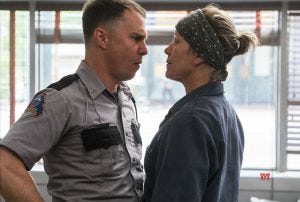Three Billboards Outside Ebbing, Missouri

Martin McDonagh has, so far, built his career on stories about biting, abrasive characters fleshed out through a trademark dry wit and bizarre eccentricities. Seven Psychopaths and In Bruges feature a whole lot of weird, angry characters cursing at each other about the chaotic hijinks they've managed to get themselves into, and both make for unique, bleakly hilarious, sometimes cathartic experiences. McDonagh’s films tote a wealth of clever, red-hot dialogue and often play as oddball human insight, kind of like Tarantino films with a tighter grip on reality and shorter tempers.
Unsurprisingly, these traits show themselves plenty in McDonagh’s fiery new small-town saga, Three Billboards Outside Ebbing, Missouri. But what sets Three Billboards apart from its callous, edgy predecessors is its warm-blooded empathy. It's the most wholehearted of McDonagh’s films to date, and it turns out that was the one ingredient standing between McDonagh and an utterly perfect film.
That's what Three Billboards is: perfect, in everything it attempts. It's simultaneously hilarious, sickening, tragic, painful, and uplifting, all anchored by Frances McDormand’s confident, blazing turn as a grief-stricken mother seeking justice for her daughter's rape and murder.
Three Billboards opens on its namesake. Three adjacent billboards, left unused for decades on an all-but abandoned stretch of Drinkwater Road, become the source of great unrest in the little town of Ebbing, Missouri, at the hands of McDormand’s pistol of a woman, Mildred Hayes. Frustrated to no end by the seeming lack of effort on the part of Ebbing’s police force to find her teen daughter Angela’s killer, Mildred decides to call out the town's beloved police chief, Bill Willoughby (Woody Harrelson). “Raped while dying,” “And still no arrests,” “How come, Chief Willoughby?” read the signs in sequence, rendered in classic colors Pissed-Off Red and Dead-Inside Black. (Good luck finding those in your 120-color Crayola set.) Mildred’s inflammatory message incites all sorts of rage from the rabble of Ebbing, and the little backwoods town practically turns into a war zone.
Part of what makes Three Billboards so special is its balance of comedy and tragedy, particularly in its use of comedy directly in the face of tragedy—without once ever devolving into comedy at the expense of tragedy (*cough*Marvel*cough*). The film takes on a similar attitude to its protagonist's: too familiar with the unfeeling darkness of the world to give a shit about what might upset anyone else to see or hear. Mildred tells it like it is, or at least how it looks to her, and the movie does the same. That's not to say Mildred is apathetic, as she displays many times her compassion for others. But she's tired of the excuses. And so is the movie. The film touches on and graphically displays such sensitive topics as bigotry, violence, gender equality, police brutality, and ignorance, without ever becoming too much about any of them in particular. Police Officer Jason Dixon (Sam Rockwell, in a characteristically pitch-perfect performance) shows himself to be an incredibly despicable individual from the start, and yet he immediately and consistently manages to be strangely endearing, thanks to Rockwell and McDonagh. Chief Willoughby subverts viewer expectations a number of times, making it difficult to tell if he's enemy to Mildred or ally. Almost every significant character shows both flaw and strength, and almost every character requires—and arguably deserves—some degree of viewer forgiveness at some point in the film.
The entire cast is electric, and the accolades warranted are too lengthy to name. The script and actors work in perfect union to bring Ebbing’s townsfolk to life. Combined with beautiful-but-never-overt cinematography and editing, perfect pacing, raucous sardonic comedy, and a humble but moving score, these things lead to a quintessential storytelling experience I've felt very few times in my life.
Three Billboards makes clear the dirty reality that makes up a place like Ebbing, which is really not as weird and foreign a place as the wild events of the story might suggest. No, Ebbing is a very real place in our world, and it exists on every corner of every street in America, and beyond. But the message here is that despite all the hate that plagues our culture,—which the film asserts may be more just a manifestation of a lack of understanding, rather than a true product of evil—you can never be sure that someone doesn't have a glimmer (or more) of good in them.
Three Billboards is undoubtedly the best film of the year so far, the only perfect one as well, and one of my absolute favorites in recent memory. Martin McDonagh and crew have delivered one of the most hilarious, tragic, un-sappy, and honest stories of all time, and Three Billboards does it with a humble heart all the while.
https://www.youtube.com/watch?v=Jit3YhGx5pU&w=585


